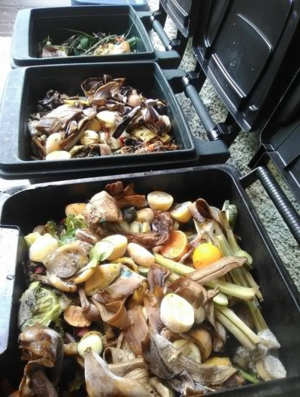MATT DE LA HOUSSAYE JULY 10, 2018
To support local efforts in New Orleans, Global Green has provided food waste collection bins used in food waste drop-offs, and supported the first food waste drop off locations in New Orleans, LA. This effort is led by Compost NOW, a local community group project, and partner with Friends of the New Orleans Public Library.
Utilizing grant funds from Walmart Foundation, Global Green has helped the expansion to five additional sites, diverting over 10,000 lbs. of food waste per year. Our goal with this program is to both benefit the community and also evaluate how these strategies might be deployed more widely as a part of a larger project on food waste management.
Compost Now’s model is based on the model Lynne Serpe started and ran with the Queens Library system—which is still active years later. The model is to use the convenience of libraries, both geographically and demographically, as an access point for composting. Compost NOW and its team of volunteers have helped divert over 65,000 pounds of food waste from landfills through their program, and they expect to hit 100,000 pounds by the end of 2018.
Seven New Orleans-based food waste collection sites run by Compost NOW are shown on the map. After food scraps are collected, they are taken from the libraries to a local farm and composted.

Compost NOW’sultimate goal is to build a network of community composters in every neighborhood in New Orleans, collectively diverting tons of food waste from the landfill each month.
We sat down with Lynne Serpe from Compost NOW to get her insight into some of the conditions that are helpful for building these kinds of programs:

Host library support
For example, the libraries store the bins at their sites. The New Orleans Library system also covers the cost of shipment of the food scraps to the compost sites.
Composting capacity to receive the food scraps
Food scraps in the Compost NOW program are taken to three locations: Sugar Roots, Scmellies Dirt Farm, and Speakeasy Farm. The food scraps are typically only transported no more than a couple of miles, and in some cases need only be transported a couple of blocks.
An operating budget
At a bare minimum, Serpe stated that for planning purposes, $3,000 per site is a way to build a program from scratch. Some seed funding is also generally needed.
Each program and city is unique. Local factors that are important to consider include local logistics costs, and, of course, the involvement of local leadership that will aid in initializing this kind of program, as well as keeping it running.
To learn more about Compost NOW, please go to compost-now.org. There you will also find a list of all food scrap drop-off days, times, and locations.




